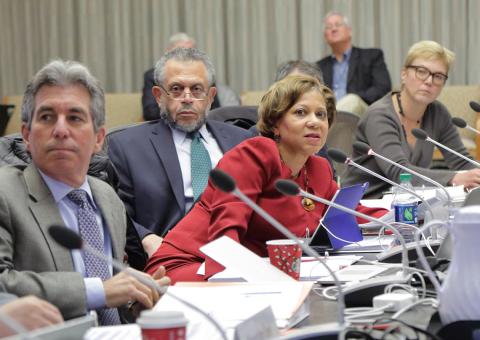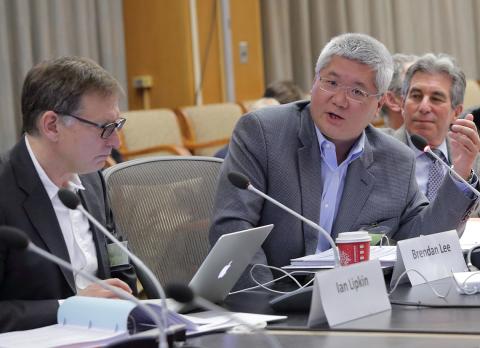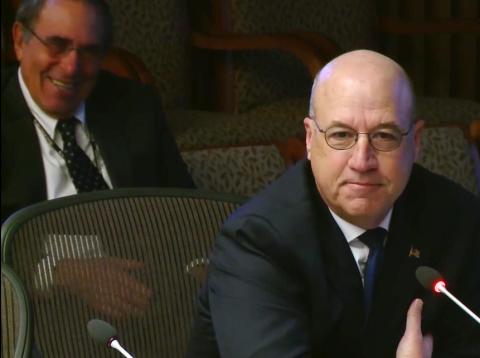‘An Amazing Ride’
ACD Applauds Collins, Meets New Clinical Center CEO

Photo: Ernie Branson
Presiding over what might have been his final meeting as chair of the advisory committee to the NIH director, Dr. Francis Collins received an impromptu standing ovation that left him visibly moved. It was Dec. 9—the second and final day of the group’s deliberations. NIH principal deputy director Dr. Larry Tabak had just outlined several possible administration/HHS transition scenarios, when various ACD members raised questions about the status of the NIH director position in the weeks just before and after Inauguration Day, Jan. 20.
Collins explained that, like all political appointees after a presidential election, he had submitted a resignation letter, required by law, to the President.
That’s when Dr. Brendan Lee of Baylor College of Medicine, attending his first ACD meeting, thanked Collins for his service to the group, to NIH and to the medical research community at large. Spontaneous, rousing applause erupted, resulting in a standing ovation around the table.
“This very likely being my last ACD meeting,” Collins said after the adulation subsided, “I want to give a shout-out to this particular group—and their particularly effective way of wrestling with difficult issues. The members of the ACD have worked tirelessly these last 7½ years and given us at NIH the kind of advice we so desperately needed from really wise people. I’m grateful to all of you here and to all the others who have sat around this table over those years…It has been an amazing ride.”

Photo: Ernie Branson
At the 15th meeting of the advisory group since he became NIH director in August 2009, Collins mentioned several achievements over his tenure that he said owe their beginnings to the ACD: the formation of the National Center for Advancing Translational Sciences, shaping of the BRAIN and Precision Medicine Initiatives, tackling the study of diversity in the scientific workforce, working with the Lacks family on use of HeLa cells in research, finding ways to integrate data science more fully into medical research and, most recently, implementing recommendations to improve the Clinical Center.
In addition, Collins publicly thanked colleagues who work closest with him. “I also want to say how remarkable it has been to have around me at NIH the most amazing staff, at all levels,” he said.
On his professional future, Collins said he will maintain his NHGRI lab, regardless of whether he holds the director’s seat in the new administration. He also said that with its non-partisan mission, NIH is regarded well in the nation’s legislative body and the agency’s forecast is favorable.
“We do have champions [in the Congress],” Collins said. “They are wonderfully substantive, dedicated leaders who really believe that what we’re doing is one of the most important activities of government...Despite the uncertainties that everybody feels when there’s a transition…the support we have from the U.S. Congress ought to be a source of optimism for what this enterprise can do going forward.”
The ACD also met the newly appointed first-ever CEO of the Clinical Center, Dr. James Gilman, a major general retired from the U.S. Army who spoke briefly at the meeting.

Photo: Ernie Branson
“I actively sought out this job,” he said, “because I believe that patients getting care in the Clinical Center—who derived the benefit of that care by virtue of their willingness to be research subjects—are about as close as I could ever get again in my professional career to taking care of service members and their families, which I did and I loved doing for 35 years.”
Explaining that he is gradually getting the hang of “NIH culture and NIH-speak,” he quipped, “They told me that EOD meant the day I started work; it didn’t mean ‘explosive ordnance disposal.’ And I was kind of happy to hear that.”
Gilman, slated to begin sometime this month, will oversee day-to-day operations and management of the hospital (see sidebar).
A number of other topics were covered at the 113th session of the ACD: Working groups on HeLa, scientific workforce diversity and physician-scientist training programs reported progress since the committee’s June meeting. An update on the Environmental influences on Child Health Outcomes (ECHO) Program was given by recently appointed ECHO director Dr. Matthew Gillman. NCATS director Dr. Chris Austin was tapped for the institute/center director’s report. NIAID director Dr. Anthony Fauci offered an overview of NIH efforts against the Zika outbreak. The status of CC improvements and the potential for efficient and stable NIH funding were also addressed.
Both days of the meeting are archived online—Day 1 https://videocast.nih.gov/summary.asp?Live=21446&bhcp=1 and Day 2 https://videocast.nih.gov/summary.asp?Live=21450&bhcp=1.

